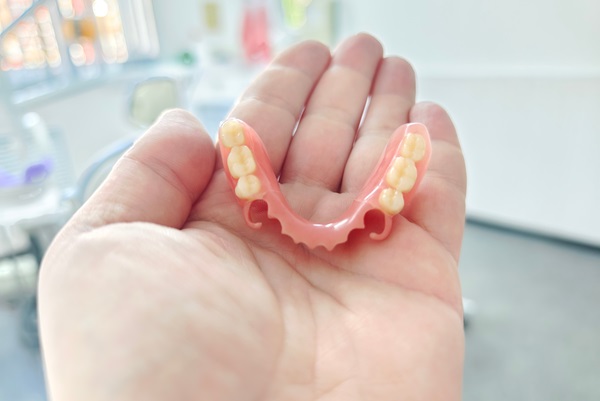Partial Dentures with Dental Implants

Partial dentures with dental implants offer a long-term solution to replacing a section of missing teeth. This is a great replacement solution even if you have multiple teeth that are missing, as it utilizes two or more dental implants to support the partial denture rather than having the dentures rest upon and be supported by the gums.
Everything to know about partial dentures with dental implants
The following is everything to know about partial dentures with dental implants, including what they are exactly, how the treatment process works, the benefits and possible disadvantages, and how they compare with alternative solutions such as traditional partial dentures that are removable.
Partial dentures with dental implants explained
Partial dentures are a highly recommended form of teeth replacement that involves the use of dental implants to support a partial denture. With traditional dentures, partial dentures rest upon and are supported by the gums alone. However, with implant-supported dentures, the partial dentures have much better support and are non-removable.
How the placement process works
There are three parts to partial dentures, which are the implants, the abutments, and the partial denture itself. Partial dentures can be used to replace a single missing tooth or a section of missing teeth, whereas complete dentures are more appropriate for replacing an entire row of missing teeth.
The replacement procedure itself for the dental implants requires a minor surgical operation. This procedure involves drilling small holes into the jawbone after making an incision into the gums and fixing the dental implant on each side of the partial denture. It can take several months for the mouth to heal after the implant placement procedure. In addition, the dental implants must go through a process called osseointegration, in which the implants are fused together with the jawbone.
In some cases, a bone graft procedure is necessary before implant placement to ensure the optimal support for each dental implant. Once the mouth has healed, a follow-up procedure can be scheduled for the placement of each abutment and the attachment of the partial denture.
The pros and cons of partial dentures with dental implants
There are certain advantages that partial dentures with dental implants offer that traditional removable partial dentures cannot provide. These benefits include but are not limited to a permanent solution for teeth replacement, fewer dietary restrictions, a more attractive smile, and the ability to preserve density inside of the jaw bone.
Of course, with higher quality and longer-lasting results, partial dentures with dental implants may cost more initially than traditional dentures. The process for placement is also more extensive, in most cases, than traditional dentures as well.
Implant-supported dentures vs. alternative solutions
Implant-supported dentures are often compared with removable dentures that are supported by the gums alone and fixed bridges. Removable dentures do not offer the same level of support as implant-supported dentures, and they are more prone to not fitting properly as they warp and the jaw shifts due to the loss of teeth.
There is also a risk of bone loss in the jaw due to atrophy with removable dentures as well, which is not a concern with implant-supported dentures. Of course, the primary advantages of removable dentures are that they are more affordable and do not require an invasive placement process.
Fixed bridges involve a replacement tooth (or multiple replacement teeth) that are supported by either dental implants or natural abutment teeth. A crown is placed on each abutment, and the bridge of replacement teeth is then attached. This does not provide as durable a hold as implant-supported partial dentures. However, like implant-supported dentures, they are permanently fixed and not removable.
Choosing between partial dentures and complete dentures
Partial dentures and complete dentures are similar as they both replace missing teeth through permanent prostheses that are supported by the jawbone. Of course, the primary difference is with the number of teeth that you are replacing. If you are replacing an entire row, then a complete implant-supported denture is best. This involves four or five implants that are strategically placed inside of the jaw to support an entire row of replacement teeth.
Are you considering partial dentures with dental implants?
If you have one or more missing teeth and would like to replace them using partial dentures with dental implants to achieve the smile of your dreams, then give our team a call today. It is our goal for each one of our patients to achieve a beautiful smile that gives them confidence each day.
Request an appointment here: https://www.islandparadisedental.com or call Island Paradise Dental at (239) 642-3233 for an appointment in our Marco Island office.
Check out what others are saying about our dental services on Yelp: Dentures and Partial Dentures in Marco Island, FL.
Related Posts
For those considering partial dentures to replace missing teeth, it is helpful to have all of their questions answered during the consultation so they can decide on the best way to replace the missing teeth. This review discusses the best questions to ask your dentist about partial dentures.Before patients reach out to the dentist to…
Seeing an emergency dentistry professional can correct a persistent dental issue. Many people suffer from recurring problems in their teeth or gums. This can lead to regular absences at work or school. Stopping the chronic problem can improve your quality of life.If patients want to know if emergency dentistry can prevent a recurring issue, here…
Going to the emergency dentistry center is likely your first thought when something in your mouth hurts. An urgent dental care dentist will be able to target the problem right away. But if you want to make sure your trip will be worthwhile, you should know if what you are experiencing qualifies as a dental…
Embarking on the journey to a straighter smile has never been easier, thanks to clear aligners. Clear aligners offer a discreet and convenient alternative to traditional braces, making orthodontic treatment more accessible for adults and teens. Understanding the clear aligners process from start to finish can help patients feel more confident and prepared for their…














